Do It
Switzerland 1999 90min 35mm
Dirs: F Bernasconi, C Davi, N Fares, W George, K Musale, T Thümena, S Werenfels
Prods: Werner Schweizer & Samir
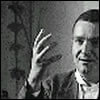
Remarkably, the CIA never put hand to the extensive 8mm footage of the group that they filmed of themselves, here inter-cut with contemporary interviews of the group, friends and family. Daniele, now a fortune-teller and future consultant, reading tea cups, appears endlessly amused by the quixotic idealism of his youth… This film is a revealing journey through the armed struggle of the 1970s, an entry into the cosmos of spirituality, and finally in 1989, a first-class ticket to freedom.
Swiss Cinema Prize for Best Documentary 2001.
ID Swiss
Switzerland 1999 90min 35mm
Dirs: F Bernasconi, C Davi, N Fares, W George, K Musale, T Thümena, S Werenfels
Prods: Werner Schweizer & Samir

With personal histories as a starting point and a healthy dose of irony, seven young filmmakers examine concepts of what it means to be ‘Swiss’. The sons and daughters of immigrants, Italians, Indians, Egyptians and Moroccan Jews among them, and with the ‘cultural baggage’ of their ancestors, they address issues of immigration, emigration and duty to ones family. Interspersed with interestingly presented statistics on the state of a ‘nation’ we see the picture puzzle of a country that is more than just the home of watches, banks, good chocolate, fabulous penknives and cuckoo clocks.
The Making of a New Empire
The Netherlands 1999 98min 35mm
Dir: Jos de Putter
Prod: Jan Heijs
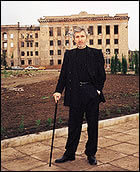
Escaped convict, war hero, media manager, mystic visionary – Khozh-Ahmed Koukhaev is the very modern model of a major Mafia don. Twenty-five years ago in Moscow he founded an underground movement that became the cradle of the Chenchen liberation movement. Today, amidst the ruins of Grozny, he rides in an armoured Mercedes dressed in expensive Italian suits. A rare portrait of one of the worlds most powerful men – a suave strategist – Noukhaev controls the flow of the planets largest oil reserves.
Procedure 769
The Netherlands 1995 80min 35mm
Dir: Jaap van Hoewijk
Prod: Jan Heijs

Procedure 769 is the bureaucratic euphemism for the death penalty in California, USA. This film focuses on eleven witnesses to the execution of convicted murderer Robert Alton Harris. Among the observers are San Quentin’s former prison warden who supervises the execution and the family of one of Harris victims. Also present are a journalist; official witnesses, including the current sheriff of San Diego; a VIP witness [the only person present who is actually against death penalty]; a psychiatrist; and Harris distant cousin who is a church minister from Alabama. All have mixed and contradictory feelings about the execution. Throughout the film, the vital role the media plays on public opinion prompts us to re-examine the real costs of extreme retribution.
Trouble in Paradise
UK 2001 53min Video
Dir: Michael Waldman

Offering the same pointed critique of his Caribbean homeland as he made of Britain in the series White Tribe, Darcus Howe asks what the former colonies have done with the independence for which they fought? “I left the Caribbean as a colony and I’ve come back to look at in a serious political way for the first time and I’ve met it as a colony.” When his sister tells that a close family friend has been shot, it proves a prelude to the tales of violence and racial division that he encounters.
Darcus’ next stop is Antigua that he claims is independantly that he claims is independent by name only. ‘ Imagine a place of 70,000 people, an island the size of Slough with a flag, a Prime Minister and a vote at the UN.” He discovers a nation that cannot feed or clothe itself nor pay its debts – a country dependent on wealthy white outsiders as ever it was in colonial times. In Martinique Darcus is shocked – the place is supposed to be the Caribbean but it looks more like Nice. There the French government welcomes him to a transplanted Europe. It would be “une catastrophe” the Martinique tell Darcus, to sink to the level of desperation and disorder of the other islands. Darcus is relieved to return to England yet disturbed that the dreams of independence he nurtured as a young man have not been realised.
White Tribe
UK 2000 2 x 50min episodes Video
Dir: Paul Wilmshurst

When Darcus Howe moved to England from Trinidad 40 years ago, he met people who were certain of who they were and what it meant to be English. Today, as Scotland and Wales seek a semi-detached relationship from England and with Europe looming ever nearer, Darcus discovers a people in the throes of an identity crisis.
“The old England of self-confidence, of people knowing who they are, knowing where they have come from, that’s dead… the whole of England is in a flux.” He travels the length and breadth of the country to discover why the English don’t seem to want to be English anymore. On the second leg of his journey in search of the white tribe, he desperately seeks the English who are proud to be white. After “40 days and 40 nights” he draws the conclusion that old England is dead. His mission for the final leg of his journey is clear: to find the “new” England. “What kind of place will England become in the next 50 years? Will there be anything left that feels English?”
Cage of Dreams
South Africa 2001 44min Video
Dir: Clifford Bestall

In Cape Town’s Pollsmoor prison, powerfully brutal gangs known as the Numbers reign supreme. In a ground breaking act towards a peaceful change in the system, the prisons first black chief warden, Johnny Jansen, opens the door to a film crew. They document conflict resolution workshops and the inmates of Cell 191, where the crudely tattooed multiple murderers, rapists and robbers share cramped quarters. Plotting the slow change of heart in the top echelon of the Numbers gang members leads to surprising glimpses of hardened souls opening to introspection.
Also screening: Special Assignment’s: ‘Inside Out’, directed by Annelise Burgess, is a disturbing follow up. The focus is on ex-inmate and 28s boss Mogamat Benjamin and his ‘welcome’ home.
The Great Dance
South Africa 2000 78min 35mm
Dirs: Craig & Damon Foster

Debuted as a work in progress at Encounters 1999, we are pleased to screen the completed multi-award-winning feature. The San are widely acknowledged to be the oldest inhabitants of southern Africa with an unbroken link to their ancestors who have lived in the same region for over 30 000 years. The film follows a group of !Xo San in the central Kalahari, focusing on the unique relationship between their lifestyle, the land and the animals they hunt. Hunting is fundamental to their culture and in “the chasing hunt” the San must “take over” the animals mind in this ancient battle of human-animal endurance. This is the first time that anyone has photographed, filmed and documented in such detail the ancient rites where the “hunter becomes the hunted”.
Changing Gears
South Africa 2001 26min Video
Dir: Margo Fleiser

Ten years ago, a black woman the wheel of a vehicle was unthinkable. While apartheid laws did not prevent these woman from driving, politics, economics and cultural traditions were obstacles to them taking to the streets.Things have changed in South Africa. The film follows three black women drivers. Elizabeth, aged 43, is a learner; Miriam, a veteran taxi driver of twenty years; and Portia, just sixteen, is a skilled go-karter, a symbol of a new attitude – her fearless driving skills starkly contrast Elizabeth’s wheel-gripping nervousness. The film explores all that driving is about: independence, power, status, a job, a means of getting around, danger, and violence. It is a funny film with loud boisterous characters.
Overspray
South Africa 2001 26min Video
Dirs: Claude Wittwenn & Ebrahim Haje
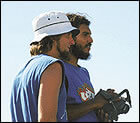
Graffiti artists, Claude and Eib, record the struggle for dominance between some of the most established graffiti crews in Cape Town. Local legends Falko, Sky 1 and Wealz 130 prepare for the showdown. They are active “writers” – veterans of the scene who make a living through their art. Then there are the more anarchic young writers, off the streets, making names for themselves with illegal “bombing.” The film culminates in the “battle”: a huge hip-hop event that draws young people from all walks of life. The signs of territorial battles are on every street corner, if only you knew how to read them… this energetic funky film will be your interpreter and guide.
JG Strijdom is Very Very Dead
South Africa 1999 26min Video
Dir: Pule Diphare
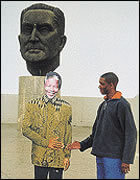
Not only is he dead, but hes also lost his head… since the completion of this film Strijdom Square collapsed, ironically, on what was Republic Day and Strijdoms head literally rolled.So heres a real piece of history… the Square was once the domain of white order and supremacy, then it turned into a commercial centre and a haven for black people who challenged the establishment and declared their freedom under the shadow of Afrikaner pride. This film of paradoxes captures the changing complexion of a city released from the trappings of a truly fallen idol.
Avanti 2000 Silver Award
My African Mother
South Africa 1999 26min Video
Dir: Cathy Winter
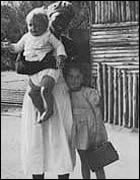
“I remember the forbidden back yard living quarters into which I often transgressed. My secret journey from our tiled and odourless kitchen into the enfolding smell of suurpap, lifebouy soap and bodies contained in that room.” This personal and evocative film is an eloquent testimony to the relationships that developed between young whites and their “other mothers” and the black children left behind, motherless, in the surrounding peri-urban townships and far-flung “homelands.”
Avanti 2000 Winner
The Fight
South Africa 1999 26min Video
Dir: Eddie Edwards

Andile “One by One” Tshongolo has literally boxed his way out of the township. This film documents his struggle, his gruelling training regime and relationship with trainer Steve Naude, and his physically demanding job as a groom in Trudy Houareaus stable. All in an effort to achieve a better life for his family. This punchy little film follows his preparation for the fight that sets him on the road to success.
Avanti 2000 Silver Award
Lady Was a Mashoza
Can
South Africa 1999 26min Video
Dir: Nokuthula Mazibuko
The abo-mshoza were expensively dressed, insolent, rebellious hell-raising women of the townships. Five women, now in their early forties, reminisce about their wild youth, and we gain a fascinating insight into the Isipantsula sub-culture of the late 70s and early 80s. Images of Joburg and Soweto in the 70s, are inter-cut with 90s urban life and a vibrant 70s disco music track.
La Promesse
Belgium 1996 90min 35mm
Dirs: Luc & Jean-Pierre Dardenne

A Cannes film festival prize winner and considered more ‘real’ than many documentaries, La Promesse engages and convinces with its evocative portrayal of the archetypal struggle between father and son, between right and wrong. Igor’s father trades in illegal immigrants. When Amidu, from Burkina Faso, falls and dies in their employ, Igor must reconcile his fathers imposed code of deception and silence with his maturing sense of duty to the man’s wife and child. The Dardenne brothers are masters of the documentary genre with 60 films to their multi-award winning credit. In this realistic film, the fiction is subtly transposed into an emotionally identifiable act of truth.
Seven Songs from the Tundra
Finland 2000 90min 35mm
Dirs: Anastasia Lapsui & Markku Lehmuskallio

The visually dazzling contrasts of horizon-less snowy expanses and lush seasonal vegetation of the Tundra is the setting for this unusual film. Director Lapsui weaves a number of legends and her own experiences into stories that document and describe the life of the Nenets, the nomadic people who hunt and fish in the Russian tundra. The first and seventh songs [the ritual sacrifice of a reindeer to the gods and a woman singing to her child] are documentary. The five central vignettes are a dramatic depiction by the Nenets of the harsh effect Soviet communism has had on their age-old social order. This is the worlds first feature film in the Nenets language.
Shooting Bokkie
South Africa 1999 30min Video
Dir: Rob de Mezieres

The lines between documentary, reality and fiction blur in this voyeuristic journey into the underworld. A Cape Town film crew is hired and told that the assignment is a profile of a juvenile Cape Flats gang member. Meanwhile, a behind the scenes camera captures crew members hotly debating the moral issues raised, particularly the dilemma that they will be accomplices to a premeditated murder.
Yizo Yizo 2 – Taking on Bra Gibb
South Africa 2001 50min Video
Dir: Teboho Mahlatsi

Episode 11 of this popular and controversial educational youth series focuses on the role history plays in understanding present conflicts. Learners valuable skills and experiences are encouraged in the classroom. Zakescar-wash business is thriving; he’s happy with Maggie and his soccer team is doing well when Captain Shai convinces him that hes the only one who can bring down Bra Gibbs drug empire. Vuyani asks his class to examine the role their own communities played in the liberation struggle. Gunman gathers evidence about what really happened to his brother. Sika decides to keep the memory of Papa Action alive in school by becoming the Son of Papa and meets Papa Action in prison. A punchy, well-researched docu-drama that redefines the medium of educational TV. Director Teboho Mahlatsi will introduce the screening.
The Alcohol Years
UK 2000 50min 35mm
Dir: Carol Morley

Carol Morely returns to Manchester where in the early 1980s five years of her life were lost in an alcoholic haze. This is a brave, unflinching poetic retrieval of an era in which rediscovered friends, acquaintances and enemies speak directly to the camera with frank and unadorned tales of Carols drunken, promiscuous behaviour, her insecurities and random acts of kindness. In Morleys search for her lost self, conflicting memories and viewpoints weave in and out, revealing a portrait of the city, its pop culture and people. An admonition about the folly of alcohol driven excess and a must-see for anyone who has had one too many…
The Charcoal People
Brazil / USA 1999 67min 35mm
Dir: Nigel Noble

Photographer Marcos Prados portraits of Brazil’s charcoal people inspired Academy Award winning director Nigel Noble to focus on the plight of several migrant workers and their families. Their lives are led on the front lines of the massive ecological destruction of Brazilian forests. Their meagre existence comes from making the ovens and stoking them with the wood to make charcoal that fuels the demand of the multinational pig iron and steel industries. Beautifully shot, this evocative portrait stands testimony to the devastation of the environment and a dislocated people.
Cunnamulla
Australia 2000 86min Video
Dir: Dennis O’Rourke

Cunnamulla… the end of the railway line in outback Queensland. Christmas in the bush and there’s a lot more going on than the annual lizard race. Aboriginal and white Australians live together but apart. Creativity struggles against indifference, eccentricity against conformity. Daily dramas unfold. Famous country-and-western singer Slim Dusty is coming to town, a teenage concert pianist is touring with her pet cat, and Santa Claus is sweltering in his suit. Sometimes sad, often hilarious, this is an astonishingly honest portrait of the eccentricities, hypocrisies and reality of life in an isolated community.
Divorce Iranian Style
Iran / UK 1998 80min Video
Dirs: Kim Longinitto & Ziba Mir-Hosseini
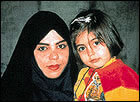
Winner of twelve international awards, this documentary is set in a courtroom in central Tehran and follows a number of women who come before a non-plussed judge and by turn use whatever they can – reason, argument, charm, outrage, pleas for sympathy, patience – to secure their rights. With the barest of commentary and fly-on-the wall invisibility the camera is turned on the court and lets it tell its own story. A fascinating look, by turns unintentionally funny and heartbreaking, into the workings of a surprisingly outspoken and humane Islamic Republic.
The Dealers, Artists and Collectors
France 1996 71min Video
Dir: Jean-Luc Leon
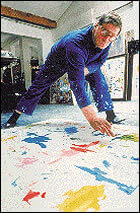
Enter the rarefied world of Frances upper-class art addicts. The simple cast of title characters has one thing in common: a love for expensive art and the wherewithal to either make, sell, or buy it. The ever-roving camera records glimpses of Basquiats of dubious origin, to the authentic works of Van Gogh, Dado, Lichtenstein, Louis Cane, Combas and Kota. Obscenely wealthy art dealers Marianne & Pierre Nahon are a dynamic and dismissive wheeling dealing duo who can make or break an artists career in the flick of a chequebook. In an astonishingly candid scene, Pierre informs the metaphysical painter Dado that his art could use more work and inspiration. A captivating, breezy romp across an exhausting schedule of dinners, gallery openings and seriously expensive purchases.
Encounters on the Milky Way
Burkina Faso / Mali / Switzerland 2000 94min Video
Dir: Juerg Neuenschwander
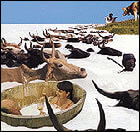
From the savannahs of West Africa to the alpine meadows of Switzerland – similarities and differences of the bovine kind are contrasted and revealed. A Burkina Faso breeder meets a Swiss dairy farmer and an organic Swiss farmer meets a charismatic vet from the Sahel. Their talk is an encounter of the second dimension, between the Third World and a consumer society, providing a clever analysis of the philosophy of milk. Part burlesque, part poetry, the film reveals people understanding and implementing change for the betterment of themselves and their herds.
Freedogme
France 2000 53min Video
Dir: Roger Narbonne
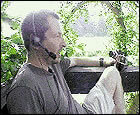
6 years ago, Danish directors Lars von Trier and Thomas Winterberg signed their “vow of chastity” and so began a new film wave known as Dogme 95. This dogma established a new genre of fiction film with particular rules[no music, no lights] and a strong documentary touch. FreeDogme examines this movement from a directors point of view. In different parts of the world, the participating filmmakers – Lars von Trier, Wim Wenders, Jean-Marc Barr, Lone Scherfig – talk to each other and, Dogme-style, film themselves… These self-portraits are edited according to the conversation led by the Swedish film critic Marie Berthelius. The result is a very special debate between committed filmmakers.
Jazz on a Summer’s Day
USA 1959 78min 35mm
Dir: Bert Stern

Bert Stern, the last person to photograph Marilyn Monroe alive, captures the mood of Americana. Its the 1958 Newport Jazz Festival where for two days and nights, music legends Duke Ellington, Count Basie, Thelonious Monk, Mahalia Jackson, Chuck Berry, Dinah Washington, Anita ODay [but to name a few!] play and sing for audiences clearly enraptured. Rehearsals and stage performances are inter-cut with boats, children playing and folks having fun. Oh, and did we mention the most uplifting and extraordinary live soundtrack ever captured on film? This is the best jazz documentary ever made. Simply delicious.
Life Without Death
Canada 2000 83min Video
Dir: Frank Cole
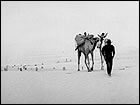
Featuring crisp b&w images and with a minimal monotone voice-over Cole records the cross-Sahara journey that, 11 months and 8 dead camels later, earned him a place in the Guinness Book of Records. This ‘achievement’ was not what drove him to it. Rather, it was his obsessive need to conquer death that made him put himself in the way of death. Though a linear journey, there is nothing conventionally linear about, nor much movement in, this haunting film. Typically obsessed, in 2000, he set off again. His body was found 70km from Timbuktu. Reluctant to die, Cole instructed that his remains be conserved at the Cryonics Institute in Detroit waiting, technology permitting, his rebirth.
Maestro, Maestro! Herbert von Karajan
Switzerland 1999 85min Video
Dir: Patricia Plattner

Conductors baton poised to strike and one fist raised vengefully in the air – this image is now part of the Karajan legend. “He could prolong a measure with a simple movement of the arm. His technique was breathtaking.” Christa Ludwig recalls. Ten years after the Maestros death, great artists tell about their experiences, the rehearsals, what it was like to work under him as an orchestra conductor, his abilities as a stage director and businessman, his fascination with the latest technology. Using archival material of rehearsals, classes for conductors and television interviews, there emerges the portrait of a modern individual with many sides to his nature. One of which is the forgotten detail that he was a member of Hitler’s National Socialist Party.
Maximum Penalty
Denmark 2000 89min Video
Dir: Tomas Gislason
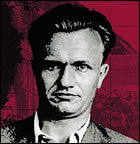
In 1937, Danish communist leader, Arne Munch-Petersen, disappeared in the Soviet Union. Sixty years later, documents found in the KGB archive reveal that he died a prisoner. Shot in Russia, the astonishing tale stretches from jealously guarded archives to icy camps in Siberia, unveiling some of the unbelievably contrived charges in a system built on the insane logic of Josef Stalin. Gislason’s style, graphics and split screen, powerful flashes of archive footage, the marches, the machinery, the adoring masses, give one the sense of the despotic power responsible for the disappearance of more than 300 000 foreigners.
My Fantasia
Israel 2001 53min Video
Dir: Duki Dror
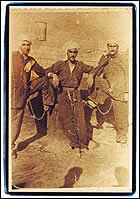
Grace, wit, patience and persistence characterise this engaging portrait of the directors father and uncles, the Darwish brothers. Iraqi Jews, they fled Baghdad in the 50’s for Israel and established “Fantasia”, designing, manufacturing and distributing Chanukah menorahs. The story weaves memories from Iraq and Israel – two homelands, two languages, two identities, and two enemies. Dror awakens to trace his Iraqi roots, only to face the reclusive silence of his father. As he digs for information about the past, he unearths a long kept family secret. A video diary that intersperses humorous moments with moving and revealing insights.
One Day in September
UK 2001 92min 35mm
Dir: Kevin Macdonald
Narrated by Michael Douglas

Hitler used the 1936 Olympics to display his mighty Aryan military. Post-war Germany’s enforced demilitarisation ensured a lack of security at what were billed as the “Olympics of Peace and Joy”. In 1972, the Palestinian Black September took 11 Israeli athletes hostage. With live TV cameras pointed at the “action”, an incredulous world looked on. So did the hostage-takers via the television set in their room… While we all know how it ended, this non-sensationalist, non-partisan virtual catalogue of the bungled rescue operation and Macdonald’s editing skills lend an edge to our feeling of helplessness and dread.
Wisconsin Death Trip
UK 2000 76min 35mm
Dir: James Marsh

Michael Lesys Wisconsin Death Trip, published in the early 1970’s, juxtaposed the photographs of Charles van Schaick, taken in the northern Midwest in the 1890’s, with contemporary reports from The Badger State Banner. This journal of Black River Falls, Wisconsin, edited by Englishman Frank Cooper, dryly reports on the daily doings of the settler folk. This stylish film, based on Lesys book, depicts the immigrants dementia and neuroses that are the nightmarish precursors of the American Dream. Monochrome photography, pan shots and teasing reveals heighten the gothic nature of life on the frontier: suicides, depressed mothers who drown their offspring, epidemics, adulteries, burials… Fascinating!
Dark & Lovely, Soft & Free
South Africa / Brazil 2000 video 52min
Dirs: Paulo Alberton & Graeme Reid
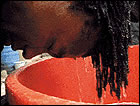
Here’s one to debunk the notion of the stereotypical homo-hairdresser… Zakhi visits salons in small town South Africa. His 4000km trip presents a different kind of queer, away from the mainstream, but stylish still, especially when it comes to hair. The focus is on the gay black man in the townships. The strong presence of the church, of music and of tribal traditions make for interesting characters that interact harmoniously with their communities. This film is based on research by the Gay & Lesbian Archives of South Africa into the effect of the new constitution on the life of gay and lesbian people in small towns.
Facing Death.. Facing Life
South Africa 2000 52min Video
Dir: Ingrid Gavshon
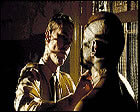
This is a haunting portrait of Duma Kumalo who, after three years on death row, was granted a stay of execution 15 hours before he was due to be hanged for a crime he did not commit. Ever since he has struggled to make sense of life after near death, for as he says: “facing death is hard, but facing life after facing death is harder.” A charismatic ‘wounded healer’, Duma is able to articulate in layman’s terms the search for the meaning of life. The film explores notions of justice, reconciliation and reparations as we are confronted by The Sharpeville Six’s emotional struggle amidst economic hardship.
In the Shadow of a Saint
Canada / UK 2000 54min Video
Dir: Richard Meech

What is it like to be the child of a famous freedom fighter… someone who’s prepared to forsake their family and put their life on the line for their political beliefs? Ken Wiwa, a London based journalist, returns to Nigeria to give his late father, activist Ken Saro-Wiwa, a proper burial. The journey is complicated by the peoples expectations of their heros son and the fact that Ken never got along with his father. Ken travels to South Africa where he meets Zinzi Mandela and Nkosinathi Biko. Both help him realise how he can live within the father’s shadow, honour the father’s memory and maintain his identity.
Carlos Cardoso – Independent Spirit
SA / Mozambique 2001 33min Video
Dir: Rehad Desai
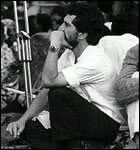
Less than a year ago Carlos Cardoso, one of Africas leading investigative journalists, was assassinated. An outspoken media personality in Mozambique, Cardosos investigations ranged from the expenditure of tax revenue of Maputo City Council to the multi-million dollar fraud committed by employees of the Banco de Commercial Mozambique. An expos9 many believe motivated his execution. This film looks at the personal and political story of a man described as the master of controversyand provides a potted history of some of his investigations.
Metamorphosis
South Africa 2000 video 52min
Dir: Luiz DeBarros

Outrageous! Notorious! Granny Lee, variously known as Granny Con, Queen Cobra and the White Queen of Africa, ran riot in the bars and clubs of Johannesburg during the 1970’s until her tragic death in a car crash in the late 80’s. Renowned for her spectacular costumes, heavy makeup and a retinue of young male admirers, hers was a life lived on the edge. She openly defied the repressive apartheid regime of the era for, in reality, Granny Lee was neither white nor a woman. This is a fast paced, stylish account of a timid small-town man reinvented.
Ochre & Water: Himba Chronicles from the land of Kaoko
South Africa 2001 53min Video
Dirs: Craig Matthew & Joëlle Chesselet

The Kunene River is the lifeblood of arid northwestern Namibia and the pastoral nomadic Himba, often called the ochre people, who occupy this harsh, beautiful landscape. Their culture has survived drought and war, but now faces a greater threat. Arresting images explore a landscape that will disappear when the Namibian government develops a 450-megawatt hydroelectric dam. It will flood 350 square kilometres of Himba ancestral lands, destroy their sacred gravesites and vital grazing for their herds. Led by Chief Kapika, the Himba deliver a moving and eloquent protest that questions the effects of globalisation and development, land rights and cultural survival.
Patient Abuse: TAC’s struggle for treatment access
South Africa 2001 58min Video
Dir: Jack Lewis

It is an unfortunate accident of history that in 1994, as the first democratic government in South Africa came to power, the HIV/AIDS epidemic was exploding. Virodene, Sarafina II, the scrapping of mother-to-child-transmission prevention programmes, the alleged toxicity of anti-retrovirals… the SA governments response to HIV / AIDS has been characterised by a series of often alarming and tragic actions. Patient Abuse demonstrates how, in response to the failure of governments HIV / AIDS programs, the Treatment Action Campaign emerged. Using unique archival footage tracing the history of TAC which has become the voice for HIV+ people in SA and internationally. A human rights organisation that has grown from a handful of volunteers to a cadre of dedicated activists challenging the might of multinational pharmaceutical companies.
Please Rise
South Africa 2000 52min Video
Dir: Sharon Cort
What is the importance of national symbols – flags, emblems and songs? An evening of musical improvisation sets the tone for an exploration of the origins of both Die Stem and Nkosi Sikeleli’Afrika. Rhythmically weaving historical fragments and strands with interviews and reflections on the political significance of both songs, amusing moments rise unexpectedly. Ida Robotaphi recounts the struggle to find her composer grandfather Sontonga’s unmarked grave and sings God Save the Queen. Personal accounts from both composer’s grandchildren, Sandile Dikeni’s poetry, and Professor Khumalo’s explanation of how the combined anthem was finally shortened reveals just how South Africans feel about the country’s hybrid anthem. This documentary was commissioned by the SABC to celebrate Heritage Day 2000.
The Secret Safari
Australia / SA 2001 52min Video
Dir: Tom Zubrycki

This is a record of one of the most successful and audacious military operations of the armed struggle against apartheid in South Africa. In 1986, the ANC set up an overland safari company that sold holidays to unwitting tourists, used as the cover to smuggle weapons into South Africa from Zambia and Zimbabwe. Volunteers from Britain and The Netherlands drove the safari truck and worked with South African counterparts in covert missions to import and then distribute the weapons inside the country. The safari operations brought in about forty tonnes of weapons over a period of seven years. No one was ever caught. A tale of individuals of courage, cunning and suspense, withtightly shot reconstructions of events using the original operatives and interviews with the passengers who discover, on camera, what was actually under their seats.
Best Documentary 2001 Dendy Awards.
Tomorrow’s Heroes
South Africa / Italy 2001 54min Video
Dirs: John W Fredericks & Davide Tosco

Thousands of youth affiliate with gangs in poverty-stricken communities and townships of the Western Cape Province. Many never reach the age of 21. If they dont die violent deaths, they go to prison or wind up in wheelchairs. Yet, young men still aspire to become gangsters, they enlist for protection, survival, status and a sense of belonging. Following two such youth, met during a prison workshop, through their incarceration and after their release, Fredericks and Tosco explore and debunk the myth “if you dont belong to a gang, you’re nothing.” Change is not easy in a society that rarely forgives and never forgets. Frankly eye-opening, extraordinarily courageous, rewarding and inspirational viewing.
